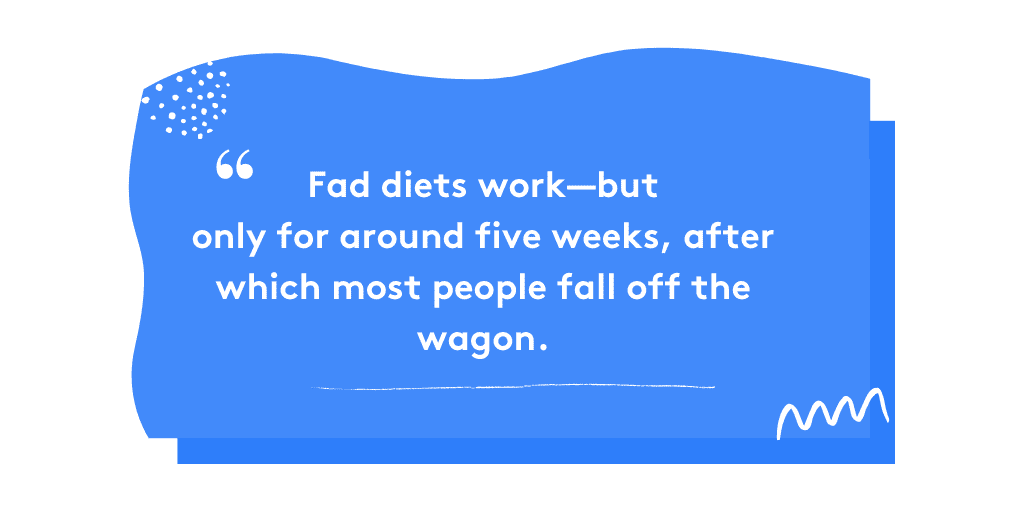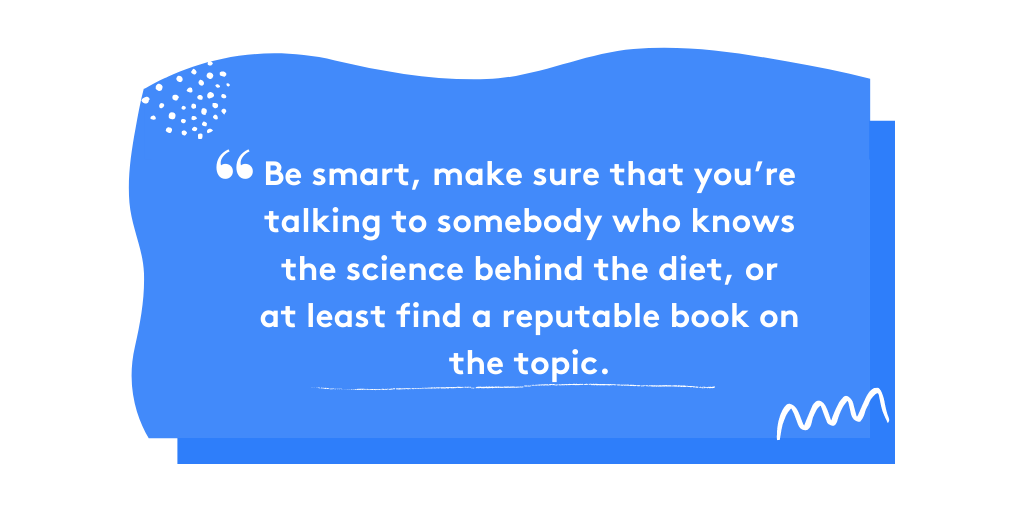Every Little Bit (or Bite!) of Nutrition is a Step in the Right Direction
An Interview with Katherine Basbaum, Morrison Healthcare Clinical Dietitian at UVA Health
If you’ve ever dieted, you know that it’s rarely a straight line to achieving your goal. You might try several different diets, resulting in ups and downs, before making the permanent life changes that push you toward better health and long-term maintenance of your goals.
For Katherine Basbaum, a clinical dietitian at the University of Virginia, finding her perfect career in nutrition also had its ups and downs. “My first love was theater; I trained as an actress. But I ended up behind the camera, working in television production.”
“At the same time, I was really into fitness. The workout I was doing had a nutrition component, a philosophy that they recommended. I trusted them on the exercise, but I took it upon myself to really dig into the nutrition piece.”
Katherine’s instincts were correct. The gym where she was working out promoted a very restricted diet, and she thought there was a better, safer way. Fad diets work—but only for around five weeks, after which most people fall off the wagon. According to the CDC, people who lose weight gradually and steadily, one to two pounds per week are more successful at keeping weight off. And no matter what your supermodel-thin goal weight might be, even modest weight loss, 5 to 10 percent of your total body weight, produces improvements in blood pressure, cholesterol, and sugars.

“I subscribed to six or seven different fitness magazines,” Katherine remembers. “I watched documentaries like “Supersize Me” and “King Corn,” anything I could get my hands on. Then I’d go to work and share what I’d learned with anyone who would listen.
Her day job, however, wasn’t fulfilling. “One day, I was having coffee with a dear friend, talking about how I wasn’t as interested in my work. She told me that I needed to change careers, that ‘diet and nutrition are what you’re really passionate about. It’s time to start over.’”
Katherine Basbaum took that advice to heart and became a registered dietitian in 2013. Having achieved that goal, she is currently focused on heart and vascular disease for Morrison Healthcare at the University of Virginia, helping people achieve their own goals—one bite at a time.
How are Morrison Healthcare dietitians helping patients achieve their long-term health objectives?
Helping patients achieve their short-term health goals isn’t much of a challenge, but long-term objectives? That’s tough! It requires a skillset in counseling that can only come from an excellent academic background in nutrition and dietetics, as well as resources that can include mentors within your company and access to up-to-date nutrition science and teaching materials.
Morrison Healthcare dietitians possess all of the above, which allows us to provide exceptional guidance and counseling to patients looking to achieve long-term and lifelong health goals.
How does UVA’s partnership with Morrison help you provide better nutrition services?
Number one, we benefit from being part of a large company. It’s not just us here at UVA. We can look at data about what works and what doesn’t from other accounts or access resources created by some of Morrison’s experts. For example, I’ll get an email from my boss saying, “check out this article from Morrison’s education resources for patients on a renal diet.”
This abundance of valuable information means that we’re not always reinventing the wheel. When we have a problem, we probably aren’t the only account with that has seen it. Others have found solutions. UVA has come up with ideas that others use. Collaborating is a luxury that saves us time, money, and meetings.
What do you think about diets?
A lot of dietitians think of “diet” as a four-letter word, and I am no exception. Diets are often plans that prohibit long-term compliance due to rigid rules and restrictions.
Around Christmas and before each new year, when I’m with my family, fad diets always come up. It’s not something we can avoid. Keto, Whole30, Intermittent Fasting—it’s always something. If you try one, just be careful. Be smart, make sure that you’re talking to somebody who knows the science behind the diet, or at least find a reputable book on the topic.

Also, keep in mind that there are some diets out there that are conducive to long-term and even lifelong compliance and results. A great example would be the Mediterranean Diet, a safe, enjoyable, sustainable, and effective “diet.”
What are the biggest challenges that face patients who want to make long-term changes?
What trips most people up is they go too hard, too fast. They may have had a traumatic event, spent time in the hospital. Even before they’ve seen me, they’ve decided that they’re going to hit the gym six days a week, cut out all bread, all potatoes, and are only going to eat steamed fish and greens. It’s too restrictive, too hard, especially right off the bat.
Most people have enough willpower and ability to follow a strict regimen for a month or two because you’re going to see results right away. Your clothes will fit differently, you’ll get compliments. But as those results and compliments start to level off, you’re left with this very restrictive plan that is difficult to stick with.
What are some strategies that help your patients avoid the fad-diet trap and achieve their long-term health goals?
Schedule a follow-up appointment. I always encourage patients to come back and see me in three months, sooner if they prefer. It gives the patient a sense of accountability. It also gives me an opportunity to see what’s working—and what’s not. I can then suggest different strategies to help them reach their goals.
When developing goals together, I always encourage the patient to be as specific as possible. Research has shown that this helps us stick to our goals. For example, if my patient says, “I’m going to start going to the gym three days a week,” I encourage them to think about what days and times will work best for their preferences, schedule, and lifestyle. The goal may then expand to, “I’m going to go to the gym on Monday, Tuesday, and Thursday mornings after I drop off my kids at school.”
Often, they’ll try a fad diet, then come back and say they’re open to a different approach. I always remind them that slow and steady wins the race.
What do you recommend to our readers who are trying to make long-term changes on their own?
Most dietary recommendations are specific to the person, and they depend on a lot of different factors. Some, however, are universal. An oldie but goodie is no sugar-sweetened beverages (SSBs). I stick to that 95 percent of the time – no sodas, juices, flavored coffees, sweet teas, vitamin waters, even fruity alcoholic beverages. SSBs cause more trouble than they’re worth. In addition to the extra calories, they are associated with myriad chronic diseases, like diabetes, obesity, and heart disease.
If you do nothing at all but cut out SSBs, you will be doing yourself a huge service.
I also try to aim for five servings of fruits and vegetables each day. That’s the minimum amount that we’ve found lowers the risk for cardiac events. The trick is to front-load – a handful of strawberries on your cereal, vegetables in your eggs, fruit during the day. You just want to avoid getting to dinner and realizing that you need to eat five cups of broccoli.
No one wouldn’t benefit from five servings of fruits and vegetables. They help control blood sugar, weight, and your cardiovascular system. It keeps your GI system working smoothly.
What made you decide to focus on heart health and vascular disease?
It wasn’t part of my original plan. When I moved to Boston for my Master’s in Nutrition Communication at Tufts University, my intention was to complete my dietetic internship at UVA, then move back to California and go into bariatrics. But nothing was the perfect fit.
Then, the dietitian at UVA left, and I applied for the job. I already knew the people, I loved Charlottesville, and I felt comfortable there. Sometimes your dream job isn’t exactly what you thought it would be. I’m all in with cardiovascular nutrition now—don’t bring up saturated fats or coconut oil without me throwing research at you. I can’t help it!
I work in both an inpatient and outpatient setting. In addition to my clinical work, I’ve enjoyed working with UVA and Morrison’s marketing teams to promote heart health and nutrition. I do television and radio interviews, magazine and newspaper contributions as well as blog posts. It has become a perfect fit for me since I came from a media communications background and always hoped I could combine the two.
Your training as an actress really did prepare you for this.
I can use my personality, my goofiness. I’m talking to patients all day long, and it is fun for me. Because I love it — I get a fair amount of media thrown my way. It’s a great opportunity to reach more than one person at a time and tell them the dangers of sugars, the importance of veggies and fruits. I’ve collaborated with chefs to do heart-healthy cooking classes, with me providing colorful nutrition commentary. After this interview, I’ll be telling a local publication about the pros and cons of sparkling water.
I can help more people, and that’s great.
Katherine Basbaum is a clinical dietitian for the Heart & Vascular Center at UVA Health System. She received her Master’s in Nutrition Communication from the Friedman School of Nutrition Science and Policy at Tufts University and completed her dietetic internship at UVA Health System. Katherine is passionate about nutrition as medicine for chronic disease and believes the key to her patients’ success lies in the establishment of realistic, achievable goals. When not at the hospital, you can find Katherine hosting heart-healthy cooking classes in the community, conducting nutritional analysis for local restaurants, and writing or speaking on the topic of heart-healthy nutrition for local publications and media outlets.





